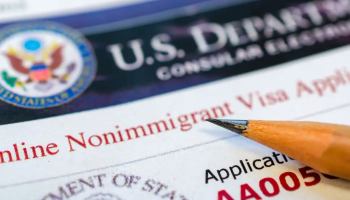Like any other patriot, sad news about Nigeria always generates deep feelings of revulsion in this author’s guts. Hence it is easy to appreciate the scope of his discomfort from recent developments which have drawn global attention to Nigeria – specifically in demonstrating unequivocally that governance in this country, is not only anti-people, but also falls far short of civilized standards as it runs on a wide tolerance for inaccuracies, half-truths, untruths and patent falsehood. Perhaps one of the most dramatic scenarios that is defining for the country a new level of response to its serial missteps with the civilized world, is its degeneration in ranking and subsequent inclusion, in the most recent US immigrant visa ban for six countries. The US had last week listed this country along with Eritrea, Kyrgyzstan, Myanmar, Nigeria Sudan and Tanzania. By the order as from February 22, 2020, citizens of these countries shall be restricted from resident visas in the US, but can only enter that country as visitors on short stay.
By extension Nigeria is now ranked on the US terrorism threat index with countries as Iran, Iraq (later removed), Libya, Somalia, Sudan (also later removed and now returned), Syria, Yemen, Chad, North Korea, Venezuela, Eritrea, Kyrgyzstan, Myanmar and Tanzania. Interestingly many Nigerians have cried wolf over the lumping of the country in a class they feel it should not belong to, and hope that the ban shall be lifted soon. However such a hope can only be justified not by any emotional disposition of the Americans, but by the Nigerian government taking specific action to disabuse the minds of the US administration that a desirable change has taken place here.
Diplomatic sources confirm that the banning of Nigeria was not considered at random nor in a rush. According to the source, the US government and Nigeria have been discussing matters relating to this country’s lax passport issuance regime as well as other security related matters. The US has been particularly worried about the issuance of Nigerian passport to undocumented persons hailing from Mali and other parts of the Maghreb. And six months ago they informed Nigeria of the possibility of the ban. The straw that may have broken the horse’s back was the open sesame granted by the Buhari administration for all Africans to come into Nigeria without adequate immigration formalities.
In the same vein is the clarification by the US government, that among other criteria for the ban is that Nigeria failed to comply with the established identity-management and information-sharing criteria, with respect to the status of its citizens. Secondly, Nigeria does not adequately share public-safety and terrorism-related information, which is necessary for the protection of the national security and public safety of the United States. And in the light of the foregoing, Nigeria presents a high risk – relative to other countries in the world, of facilitating the avoidable entry of terrorists into the United States, through identity-theft related endencies..
While debunking the US claims may in one sense, serve the purpose of ‘protecting’ the image of Nigeria, whoever is familiar with the diminished premium on and mis-management of public records and especially demographic data in Nigeria, will easily appreciate the dilemma of the Americans in coming to terms with the Nigerian situation. Whereas by Nigerian standards, the US complaint may seem rather far-fetched, for that country their demographic records constitute the very oxygen that drives their private and social lives. Comparing the significance of demographic date in both the US and Nigeria, is like juxtaposing the illuminations from a white fluorescent light in a dark room with that from a lighted candle in an equally dark room. The difference is at any time, crystal clear.
As a civilized society, the US places significant premium on the citizen demographics being the quantifiable characteristics of their population, and which is recorded with as much precision as can be mustered. And such efforts are just for the purpose of ensuring that every citizen is adequately provided for in terms of basic social amenities, as well other considerations. Hence demographic characteristics such as distributions of the population in order of gender, age and over space, are consistently and accurately monitored and recorded.
Not so for Nigeria. In this country demographic information is to say the least highly politicized and hence susceptible to manipulation leading to the same routinely featuring grave inaccuracies in both its computational processes and analyses. In the same vein is the issue of citizen profiling also problematic, as personal data is often adjusted and ‘doctored’ as frequently as clouds change formation. The outcome is that wittingly or otherwise, suspicion hangs over the head of every Nigerian as a potential or actual personal-data cheat. Incidentally, while a situation of diminished premium on personal data may be tolerated within the country, when such is taken outside the country to areas where due scrutiny prevails, the outcome could turn out to be significant – like this case of the US banning Nigerians from certain privileges they had taken for granted.
Meanwhile, even as the issue of consistency and integrity of Nigeria’s demographics may rankle the ear, a greater sin from the same crucible of muck, remains the penchant of several public office holders to proclaim patent falsehood with the hope that the ambience of officialdom will cover their indiscretion. Painful as it may be for many Nigerians, the current Minister of Information Lai Mohamed is presently stuck in a messy affair in which his recent bare faced denial of his previous pronouncement is haunting him. In the wake of the motion for the anti-people anti-social media bill which was sponsored by Senator Mohammed Musa, under the title “Protection from Internet Falsehood and Manipulations Bill”, and presented to the Senate on November 5 2019, Mr Lai Mohamed had then spiritedly canvassed plans of the administration to “sanitise” the social media circuit, and vowed that nothing would stop the administration in that venture.
However, during a recent interview with Tim Sebastin of Deutsche Welle the German television network, he simply denied the existence of the bill and debunked his earlier take on the matter. Mr Lai Mohamed escaped with a semantic slip as Tim Sebastin missed the exact title of the contentious bill. Yet as the proverb goes that a rose by any other name, will smell as usual, Lai’s maneuver did not fool Nigerians as a welter of harsh reactions have trailed his misadventure.
Why he has not resigned from the Buhari cabinet even with this bare faced act of indiscretion is a situation the administration owes Nigerians a duty to explain. It needs to be clarified when the indulgence in mispresenting facts as well as peddling untruths and half-truths, became the accepted modus operandi of the Honourable Minister of Information. But this is Nigeria where people in power easily escape with even blue murder. After all, in their monopoly of impunity, what is so special in telling a few lies in order to gain personal advantage for self-aggrandisement?
Apparently, the US under Donald Trump is not amused and has said, so in a clear language, through the visa ban. Nigeria has apparently been escaping sanctions in the past under previous US Presidents and under equally different circumstances. How Nigeria reacts to the current US action under a no-nonsense Trump, is a matter for another day.

 Join Daily Trust WhatsApp Community For Quick Access To News and Happenings Around You.
Join Daily Trust WhatsApp Community For Quick Access To News and Happenings Around You.


